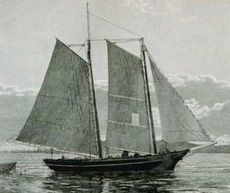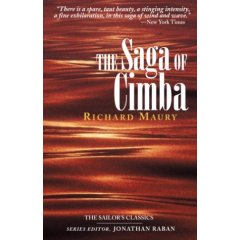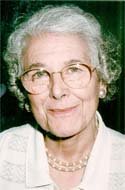Schooner story's long survival
Also in today's blog
The Tiger Who Came To Tea
Bookseller recommends sisters' novel
Sorting through a pile of old press clippings, I paused to re-read the 1998 obituary of Richard Maury [American father, British mother] headed "Author of minor classic on his schooner voyage to Fiji".
Maury, who was 87 when he died, sailed half way round the world in a 35 ft schooner, Cimba, when he was 23. His book, The Saga of Cimba, "a story of youth and adventure set in a world where there are still truly remote areas to be reached only by lonely voyages across empty oceans" was published in 1939 and is still in print at The Narrative Press which "publishes only true, first-person accounts of historical adventure and exploration. We now publish over 100 titles – all are high-quality, newly-typset paperbacks. Most of these adventures are classics, about people and places now long gone. They take place all over the world – in Africa, South America, the Arctic and Antarctic, in America, on islands everywhere, and on the open seas. Some of our authors are famous – Ernest Shackleton, Kit Carson, Henry Stanley, David Livingston, John Muir, Richard Burton, Teddy Roosevelt, Charles Darwin, Jack London, and Buffalo Bill, just to name a few. Every one of these books is a great story, and every one of them is true: the author is a real person who is telling us what he saw, did, and felt under extraordinary circumstances."


Or, if you're into ebooks, go to Ebookmall. I spend so much of my day at the laptop that I don't want to screen-read in the evening. I'll probably get one of the island's four booksellers to order the McGraw-Hill Sailors' Classics edition which I read about at Amazon UK. The following reviews of the book were picked up from Amazon US.
"Having sailed for 40 years, I came across an old edition of this gem written in the 30's and was astounded by the economy of prose, yet the depth of feeling created by its author.
It is a deceptively simple story, but packed with thoughts and observations which are thoroughly relevant today. And it is written in a style which came BEFORE the present supermediatic hyperbolic overstatement that characterizes most of what we read and hear today.
It is an excellent gift, and an inspirational work, even if you are never planning to cross an ocean. It is in a word, a classic. (And it is wonderful to think about how these places actually were in the thirties, and to listen to proper nautical language and vocabulary which has been washed away by the advent of the jet plane and skidoo.. Bon voyage!"
and
"This is a book for sailors who love words, and readers who sail. Not an instructor, Maury spends his tale with the spareness of bare poles. Seamen will love the action - and the calms, mostly for the lovely lyric writing and the gift Maury has with print. Kin to the Maury who invented organized navagation charts for seaways, tides, winds, currents; this tale of the smallest fishing schooner to make 1937 ocean history reflects talent aboard and with the pen for Richard Maury. Best book I've read, sadly I couldn't enjoy it from land."
The Tiger Who Came To Tea
Recently Publishing News reported that HarperCollins had hosted a tea party at Claridges for "the doyenne of children's books" Judith Kerr who is 83 this month. The mention of Claridges revived happy memories of lunching there with Alan Boon when Mills & Boon's offices were in Brook's Mews, just behind the hotel, instead of out in the sticks at Richmond. Actually Richmond is a nice place, but not as convenient for visiting authors as the centre of London.

Since our son's childhood, I haven't taken much interest in books for small fry, but now, with our grandson's second birthday approaching, I'm looking out for a book for him and Judith Kerr's The Tiger Who Came To Tea, mentioned in PN as her first book, published in 1968, sounded perfect. First I checked this choice with his mother, also a bookworm, and then trawled St Peter Port's three bookshops. Only one had the book in stock [in a pack including a TWCTT tea-set] but another knew the book as soon as I mentioned it and the third had sold two [ordered] copies this year.

To my surprise another book with that title was published in 1996. It was written by Kathy Creamer. "The story is set in Raffles Hotel and relates the famous tale of the tiger who was unfortunately shot in the hotel. The illustrations are from actual scenes in the hotel and the story ends with a strong environmental message aimed at preserving the dwindling numbers of tigers in the wild." As it was published by OUP for the Australian and New Zealand markets, perhaps the publisher felt poaching Judith Kerr's title didn't matter.
When I was 22, I spent an exciting night at Raffles, but I don't remember being told that a tiger had been shot in the billiard room in 1902. I did know that Conrad, Kipling, Somerset Maugham and Noel Coward had stayed there, and I knew about Sir Stamford Raffles, founder of Singapore. I wonder how many schoolchildren are taught about that marvellous man today?
Bookseller's recommendation
Recently, for the first time this year, I called at The Southside Bookshop opposite the clock tower and overlooking the harbour at St Sampson's, the island's second, smaller town.
Having enjoyed many long book-chats with the shop's two previous owners, I was keen to meet their successor, Jerz Jurkiewicz, who has Polish forbears but was born and brought up in Guernsey. The shop now has a website where you can see the clocktower and the harbour at low tide.

While we were chatting, my eye was caught by the cover of a paperback on display near the counter. A French chateau in the distance, a field of sunflowers in the foreground.

Mr Jurkiewicz told me the book had been recommended to him by two customers and, having read it, he could recommend it himself. So I bought To My Daughter in France by Barbara and Stephanie Keating who, according to the first page, grew up in Kenya. "One sister now lives in France and the other in Dublin. This novel - a seamless collaboration - is their first." The Vintage edition was published in 2003 and I wonder how I missed it.
I also missed their second book, Blood Sisters, published last autumn, of which an Amazon reviewer has written - "Having grown up in Africa, I bought this book because of my love for Africa, and it was so beautifully written. Enjoyed every moment of it and could not put it down. I could smell the bush, feel the sun on my back and hear the sounds of Africa. Well done to the Keatings for writing such a beautiful book that made me cry, laugh and appreciate all I have grown up with in Africa and also what I have experienced living in England. Highly recommended!"
By chance I have been re-reading Evelyn Anthony's Voices on the Wind [Hutchinson 1985] which is about a woman who, during WWII, was sent to Occupied France to work for the Resistance. The Keatings' novel To My Daughter in France is set partly in 1970 with flashbacks to the war years when several of the principal characters were involved in the Resistance.
More about Evelyn Anthony next weekend.
